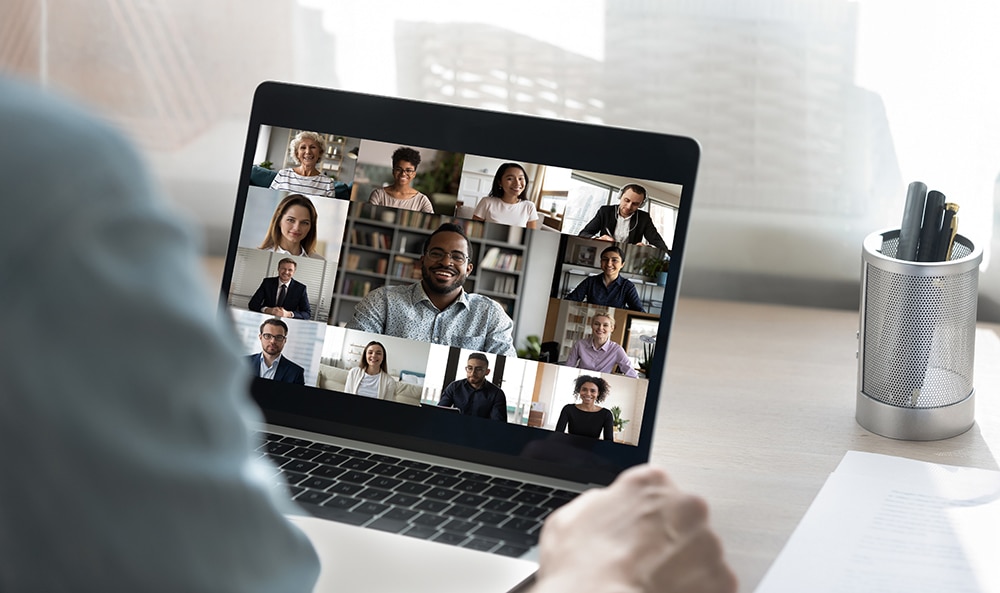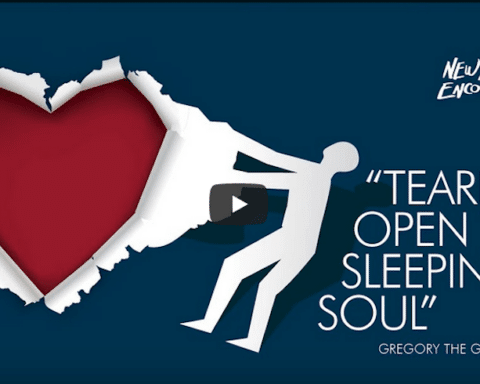When the men’s conference that Matt Ingold was scheduled to speak at in 2020 was canceled because of COVID-19, little did he know that a virtual door would open as that window closed.
Ingold and others came together to organize an online Catholic conference to provide a venue for Catholic speakers to minister to a Church in lockdown.
“We had a small vision in mind,”‘ Ingold said. “We were hoping that maybe we can get four or five speakers and have an audience of maybe 500 to 1,000.”
What happened calls the multiplication of the loaves and fish to mind.
The conference ended up with 64 presenters and nearly 64,000 people registered. “We knew at that moment that this was something that the Holy Spirit was leading,” Ingold said. “We just knew that we tapped into a need in the Church.”
“Over the past year, we’ve been discovering what that need actually is,” he added, in reference to his work as a partner with Virtual Catholic Conference (VCC), which hosts online faith events.
VCC is the company that emerged from that inaugural experience, with Our Sunday Visitor as one of its investors.
Crisis response
Ingold recounts that initially, when in-person gatherings shut down, virtual Catholic events were the best option available.
That was the case in the Archdiocese of Atlanta when their annual catechist conference was canceled due to the pandemic.
Michele McHale-Pickard liaised with VCC on behalf of the Atlanta Archdiocese in order to move this conference online in August 2020. “We didn’t want to lose the momentum that we had,” she said of why they didn’t cancel the event all together. “We’ve had one every year for the last 12 years in Atlanta.”
“It gave us some semblance of normalcy,” McHale-Pickard told Our Sunday Visitor.
Like Ingold, McHale-Pickard had a small goal in mind. She hoped to reach the approximately 1,500 attendees who normally come to the annual in-person event.
She too was in for a surprise.
“It exploded,” she said of the more than 8,500 people who ended up registering. “It was just phenomenal.”
The online registrants included people from dioceses across the U.S. and throughout the world. “We were just floored by this,” McHale-Pickard said.
The fruits
“We’ve seen a tremendous response to our events,” said Chris Cope, the creative director of Cardinal Studios.
“The hunger to grow, to learn and to connect is very strong, and we’ve heard so many testimonials from people that have taken nuggets away from presentations and been able to implement new habits or disciplines in their daily lives,” said Cope.
He explained that in 2020, Cardinal Studios, a multi-media production and consulting agency, was working with Damon and Melanie Owens as they were launching their new ministry, Joyful Ever After.
“With the lockdowns, the idea of hosting a Catholic marriage summit seemed like the perfect idea to reach couples around the world to inspire them and provide hope and practical advice on how to help their marriages grow, heal and thrive,” Cope said. “We had nearly 40,000 couples register, and it turned out to be an extremely fruitful initiative.”
Since then, Cardinal Studios has produced several large-scale Catholic online events that have served more than 100,000 participants.
“Virtual events play a critical role in reaching those we couldn’t generally reach at the local level,” Cope said. “It’s also a great way for people to have access to excellent content, and to engage with presenters and attendees from around the world in a way they never could in person.”
Ingold of Virtual Catholic Conference concurs. He stresses that there were people attending virtual events who would never have gone to a live conference. This could have been for reasons of accessibility — because they were homebound through infirmity or with children — or who lived in poorer nations.
“It’s also convenient for people,” McHale-Pickard of Atlanta said. “It’s a convenience that we didn’t really think of before.”
McHale-Pickard also appreciated how the online platform enabled organizers to speak directly into current exceptional circumstances — whether related to COVID or issues of racism — and equip people with practical tools to manage these developing situations.
She acknowledges that, had the archdiocesan event been in-person, conference rooms would have been pre-booked and there would not have been the flexibility to respond to emerging needs.
“We were able to pivot and do those types of presentations where that would not have been even possible if we were in-person,” McHale-Pickard said.
Unique identity
Cope suggests that online events aren’t just live events that are now virtual. “They’re two completely different things,” he said. “We caution many people we work with that it’s important not to expect the same experience and outcome online as you would from an in-person event.”
The Cardinal Studios director cites how online events cannot replicate the moments “where the magic happens at in-person events,” such as going out to dinner with friends afterward, side conversations and connections over coffee.
“Online events are much more about gaining practical tips for your personal situation and bringing those new habits or ideas into your family life,” he said. “It’s more of a functional dynamic than a relational one.”
Tim and Barb Hitz would agree. The Colorado Springs, Colorado, couple completed Epic Intimacy, a program created by Joyful Ever After and Cardinal Studios in 2021 following The Catholic Marriage Summit last year.
The program included Facebook Live sessions with Damon and Melanie Owens as well as 13 pre-recorded talks couples could view at their leisure.
“It spurred some good discussions between the two of us,” Tim said of the program. “Even though we’ve been married 40 years, there’s always something you can learn.”
Barb shared how she and Tim have gleaned much from the course and have even offered to purchase the series for their married adult children. “We are behind what we’ve gotten out of this series,” she said.
No replacement
That said, having facilitated Bible studies for many years, the couple is attuned to the value of in-person gatherings, especially for developing friendships and building community with fellow participants.
In particular, Tim noted the benefits of small informal interactions with others, such as asking how someone’s week is going. “Afterwards some people might stay around and chat for five or 10 minutes,” he said.
The Hitzes believe this type of connection is vital. Though they affirm the significance of online platforms that make resources and speakers more accessible, they’d also appreciate seeing an in-person element.
“In a small group sharing, you can build the personal support that you need as a couple to keep walking your faith walk and your marriage,” Barb said.
Cope, of Cardinal Studios, recognizes this reality as well as the fact that virtual gatherings have a unique and vital purpose.
“While it could never replace the experience of getting together in-person with loved ones or friends, it certainly provides a powerful and positive experience when those types of gatherings aren’t possible,” he said of virtual events.
Ingold too sees virtual gatherings holding a distinct place and role in the Body of Christ that isn’t a direct substitution for in-person events.
“It’s important for us to look at these virtual events, not as something that replaces the in-person events — because you can’t, we’re Catholic, we’re deeply sacramental,” Ingold said. “The matter of our faith matters.”
The partner at VCC speaks of being present at Mass and before the Eucharist, receiving Communion and hearing the words of absolution. “You can’t replace these things in the virtual world,” he states.
Changing situation
In the early days of the pandemic, McHale-Pickard, ministry lead for catechesis and certification in the Office of Formation and Discipleship at the Archdiocese of Atlanta, acknowledges that such events filled an acute need. “This gave people something to hold on to, to continue to expand their knowledge base [and] give them something to work with,” she said.
Even though McHale-Pickard perceives that there’s been a calming down of the initial desperate attempt to remain connected, she believes online events are here to stay because they meet other needs.
“I think we see that there’s always going to be a place for them in the toolbox that we use,” she said. “There’s going to be people that, for whatever reason, can’t make a live conference but want that education, they want to further their knowledge, they want to try to learn new things or expose themselves to expert speakers in the field on their topic of interest.”
“There’s always going to be that need, and there will always, I think, be an audience for that,” McHale-Pickard said. “I don’t think it’s ever going to go back fully the other way.”
Nicole Snook writes from Canada.





